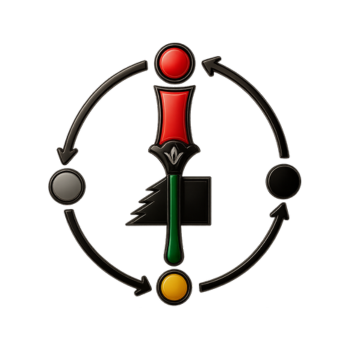-
@taharka2018 Greetings Tristan, I watched your May 2020 talk on Medew Netcher Through Ebonics (https://www.abibitumi.tv/v/1345554880/Medew-Netcher-Through-Ebonics) and LOVED it!! Got a lot of clarifications on how English works and how it limits my thinking. These killed it!
1) your comparisons of mdw ntchr, AA, JAM phrases. The deep AF structure survived!! I see now that it was the deep linguistic structure that my parents wanted to banish from my speech. Words like ain’t, got, at and double negatives were punishable utterances. I need to bring that shit back.
2) you struggled to understand and translate mdw ntchr until you began to look at it from a Jamaican language pov. I know that English (and any eurasian language) “thingifies”, creates distance, distorts and limits thinking, but seeing AF as relational and EU as alienated drove that point home!! Speaking English is to speak always from the dungeon!!
3) why is mdw ntchr relevant to Black folx today? introducing folx to AF language by showing how they are already familiar with or using an AF linguistic structure is genius! This makes me feel like I already have a buried template that I can connect to, practice and use for scaffolding. Love the notion that trying to learn mdw ntchr by translating from English will make it harder!! Also loved the suggestion that Jamaican be made the official language in Jamaica instead of French.
Your talk made me feel hopeful and it also showed me why @obadelekambonbon is coming correct when says learn an AF language.
After your talk, Energy, by Sampa The Great hits all different kinds of ways!
4 years ago ·
7 Comments-
Asante Sana Ajay. I’m glad that you found my discussion constructive (though I do have a long ways to go). Your point #3 is really important. I think it’s important that Afrikan people in the diaspora understand that we *ARE* Afrikan — not “Afrikan-ish” or “Afrikan influenced”. Translating our languages in our own languages helps in this regard.
-
Trying to re-educate as quickly as possible but only recently realized the importance of learning AF language. Just watched this short video on Garifuna and thought it was interesting that the brother (town leader) said that folx who speak Garufina were not from Afrika. Later on he says they came from St. Vincent which begs the question, how did they arrive at St. Vincent? He speaks at least 3 languages smoothly transitioning from one to another all while describing the decline of Garifuna. Made me wonder, how many AF diasporan languages exist in addition to Garifuna?
-
@taharka2018 the “Afrikan-ish” comment made me laugh because you know that a lot of Black people in the Caribbean, specifically these “multi-cultural” nations like T&T and Jamaica will not claim to be fully Afrikan, but rather will tell you everything else they are supposedly “mixed” with and then MAYBE they will mention the Afrikan ancestry. Then they say “oh but that was so long ago”. I remember as a child having difficulty speaking this white mans english language but as I’m sure you know, if you didn’t try to sound “proper”, you were looked down on. Just some thoughts , I’m sure @ajayrevels has seen this trend too.
-
@makiyasmack haha! I often hear ppl leaning into being “mixed” as a get-out-of-Black card. Recently read a brother on twitter describe say he had “cute mixed kids”, which means in his mind the unspoken alternative is to have “ugly Black kids!” I think a lot about African parents who want to gaze into the face of a non-melanated, maggot colored child and feel good about what they see.
Dr. Naim Akbar describes how this attitude developed in his book “Chains and Images of Psychological Slavery.” I feel like we need an organization like the Cuban Medical Mission where small groups of trained “Black missionaries” bring food, healing, Black consciousness (anti-Christian + KMT historical education + language) and skills training (self-sufficiency) to our communities in order to deal with the mis-education, the self-hatred, the craving to be yurugus and the lack of life skills (construction, farming, textiles, etc).
-
Yeah, @makiyasmack I literally speak the way I do today b/c it was beaten into me. If I didn’t pronounce the right sound at the right pitch and speed, I got smacked at home or failed in school. Having ppl “look down” on me didn’t work on me. My parents had to resort to physical punishment to change the way I spoke. haha! Of course the result is that the Black kids at school told me I sounded too white and the maggot kids said that I sounded “stuck up” and “uppity.” The trap of yurugu education is to put us in a double bind so that you are always aiming to perfect what yugs value, but perfection actually means being perfectly dead spiritually, mentally, physically! This re-education journey has shown me that AF language structures are a form of chemo that cures yurugu cultural cancer. Giving you a heads. up now that I’m going to ask you to say things using your original words. haha!
-
@ajayrevels @makiyasmack re: the Eurasian language problem, I think I was in an odd scenario in which I was not discouraged from speaking JA. This is largely due to my father recognizing the Eurasianism of the language issue AND, on top of it, this is simply how my grandparents talk — I think the latter aspect is really critical in my case. But you both raise a point about Yurugu miseducate ‘n’ diseducate system, the language aspect reinforces the colonial alienation leads to these ‘talking white’ dilemma.
-
-
@Makiyasmack indeed, this ‘multicultural’ sickness is sick indeed. In JA, an immediate example is the Krakka friendly motto ‘out of many, one people’. Also, in the JA community in Toronto KKKanada you will find things like ‘Rasta Pasta’
-
-
-

